For two hours it was as if all that surrounded Joel Alcaraz, 10 and Greg Lope, 33, had disappeared. Divided physically by a chessboard and mentally connected by the game, they competed at the Contra Costa College Community Chess Tournament this past Saturday.
“If I beat him, he is just a kid, but if I loose, I got beat by a kid,” Lope joked lightheartedly after the game. Lope won, but it was tough and he knew it would be — he had seen Alcaraz play before.
Lope and Alcaraz were two of the 28 participants of the fourth tournament organized by the West Coast Chess Alliance, a nonprofit community-based chess advocacy group. Co-directors, Trendell Ball and Will Delaney are promoting chess by teaching it in Bay Area schools, nonprofits and community centers. Some of the participants were their students. Contra Costa College supported the event by providing the facilities and the chessboards. Players all ages were welcome and registration was free.
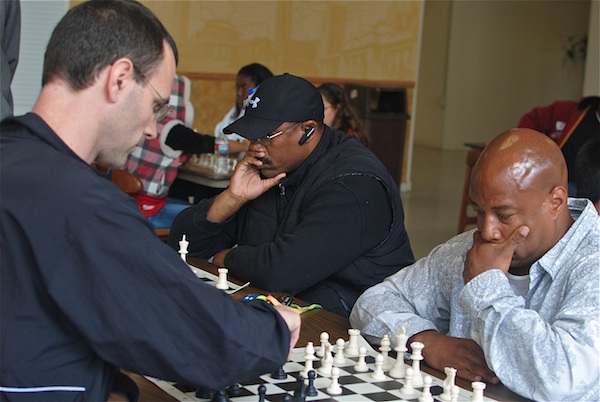
The turnout at the tournament included a very diverse crowd of people: The youngest participant was 6 years old and the oldest was 50. Some were Richmond residents and some came from surrounding cities. “Chess is a great equalizer,” said Ball. “You can compete on an equal basis with anybody.”
The event was a “quad tournament” in which players are divided in groups of four. Each participant has to play all the members of their group, so they play three games. “The quad is a fun way to play,” said Ball because it’s a friendly format for beginners. “Players talk and get to know each other in their group. Plus you have more winners.”
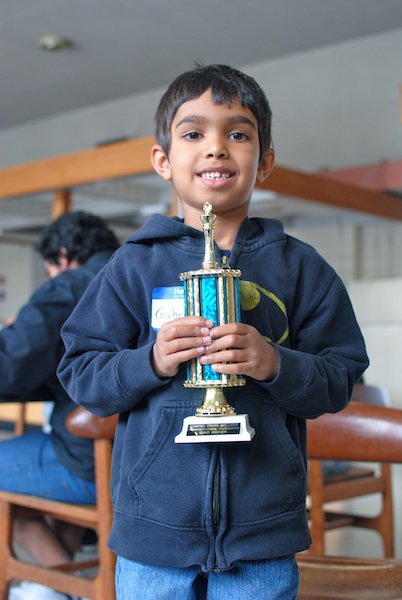
There were seven quads (groups of four) and seven winners in this tournament. The kids who won went home with a trophy. “Young people love the trophies,” said Ball.
Jaqueline Leal, 10, didn’t win this time but she wants to compete again, “so I can win the trophy.” Leal learned to play at Girls Incorporated of West Contra Costa, a nonprofit involved in education and advocacy for girls. She says she likes how chess makes her focus and she likes the challenge of competing. At home she plays chess with her 13-year-old brother and she writes down moves and strategies to win.
Do Nguyen, 17, who is from a family of Vietnamese immigrants, learned to play a year ago and has started studying chess moves, too. He sometimes plays Chinese chess with his dad or his brother. Like many other players he likes the challenge and the social aspect of the game. “You go to tournaments and you meet new people,” he said. “You get challenged pretty much every time you’re playing and every time is different.”
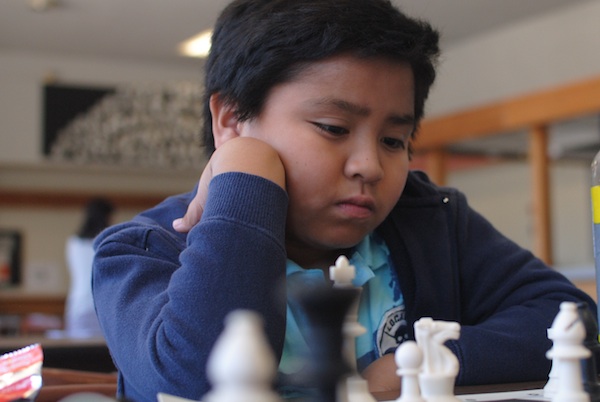
At this tournament, chess players were divided by age. Alcaraz was the only child who asked to be put in a quad with adults. He didn’t care about winning, “I want to learn,” he said. If Alcaraz had played kids his age or older, he would have definitely won said the organizers.
The parents of some of the participating children were at the tournament. Joel Alcaraz’s father, Noi Alcaraz, was one of them. He taught his son to play chess when he was four. “He used to play with me before, but I never win now,” he said, laughing, “I tell him, you’re not learning anymore when you play with me.”
For Alcaraz, it’s great to see his son be so passionate about chess — it was his dream to be a great chess player but “I didn’t have the chance to excel,” he said. Now his son plays chess online and although the family lives in Vallejo, his father takes him to the Berkeley Chez Club every Friday.
Silvia Naldoza, the mother of 8 year old participant Vans Naldoza, said that her son learned to play just a month ago when she persuaded him to join College for Kids at Contra Costa College. Naldoza said her two sons play chess at home. “I know it really challenges their mind. It’s like a mind marathon and I want them to have their brain exercised,” she said.
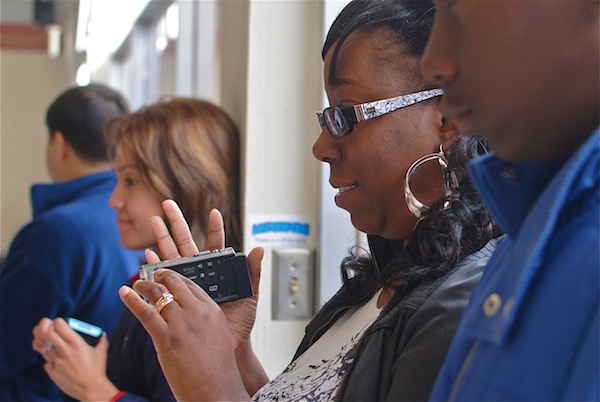
“Chess can be used to promote positive self-esteem in a student because it’s a thinking game and a lot of the youth today aren’t being challenged enough in terms of thinking,” Ball said. His nonprofit is about promoting the positive values embedded in chess. “There are a lot of academic crossovers,” he said, but the group also wants to promote community and family chess playing.
Some family members competed at the tournament. Brother and sister Mauricio and Julissa Morfin from Peres Elementary School in Richmond both competed in different quads — Mauricio won the trophy. Father and son David and Gabriel McDonald competed in separate quads too, and both of them won. At six years old, Gabriel was the youngest winner.
Other adults who do community work with youth were there to support the kids, including Doretha Morris, the executive director of Girls Incorporated of West Contra Costa County. Eight girls, ages nine to 14, were competing. For Morris, chess is a really positive thing. “It’s all about increasing their analytical and critical thinking skills. I know that chess will really help them in math as they go along with school,” she said.
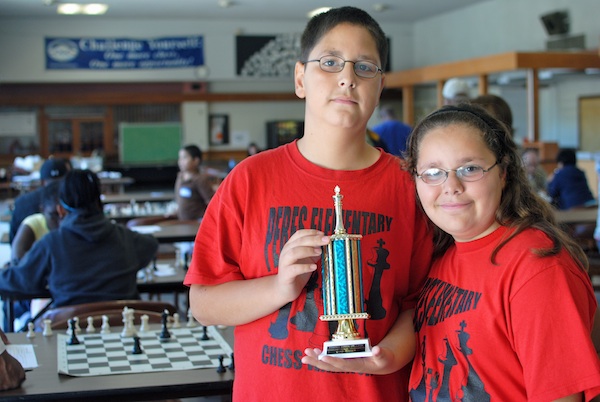
One of the winners Mauricio Morfin, 11, and proud sister Julissa, 9. Photo by Veronica Moscoso.
Carlos Taboada, who runs the chess team at Richmond High School and is a school counselor, came to support two of the kids from the school’s chess club and his own son David. “It is very valuable activity to cultivate mental discipline in the students,” he said of chess.
“We think that chess can improve academic skills,” said McKinley Williams, president of Contra Costa College, who attended the tournament. Williams said he’s read research that shows how chess can improve mathematical reasoning, critical thinking and attention span. “It’s a great support for someone that is involved in academic pursues,” he said.
Williams is such a supporter of chess that now the campus has a few outdoor tables with chess boards. “We wanted to make the college a place where people can come and play chess casually,” Williams said. A couple years ago, he even invited to campus Maurice Ashley, the first African-American to attain the title of International Grandmaster of Chess in 1999.
According to Ball, on top of the academic values, chess promotes educational values that can be very useful to youth. “It’s about thinking strategically. You need those type of skills in general to navigate in life,” Ball said.
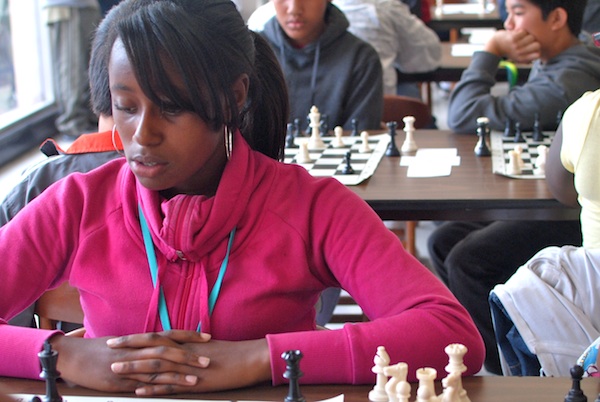
Laurel Darnel, 13 was one of the tournament winners from of Girls Inc. She enjoys basketball but she enjoys chess, too. She plays at the computer for two or three hours a week when she is at home. “You really need to know how to focus to play chess, and it’s the same in life — you need to focus on things and know where you want to be,” Darnel said.
According to Ball, some life skills can be taught through chess; for example, taking responsibility for your actions. “When you make a move on the chess board there are consequences that can be good or bad that you have to deal with,” Ball said. He said that chess can also be used to teach kids about being persistent. “If you keep playing and making moves, you can get yourself out of a bad situation.” One very important lesson, he said, is to think before you act. “Think about the consequences of your actions before you make a move that is going to be detrimental to yourself,” Ball said.
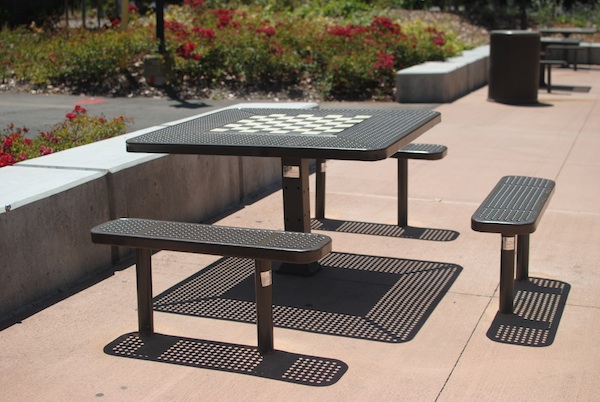
One of the missions of the West Coast Chess Alliance is to bring chess to minority groups. The alliance has programs at Perez Elementary School, Girls Incorporated, College for kids in Contra Costa College, Cornado YMCA and at the West Oakland Library. “A problem that youth has, and particularly those that are considered at-risk, is they aren’t making good decisions,” Ball said. “Chess, the game itself, is all about making decisions.”
August 2, 2010 Richmond Confidential

